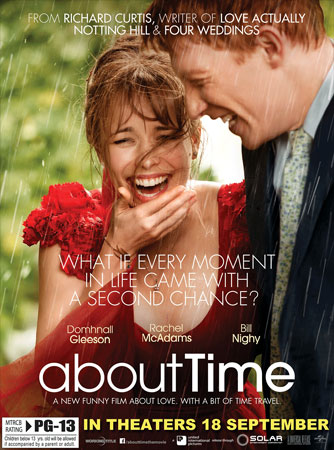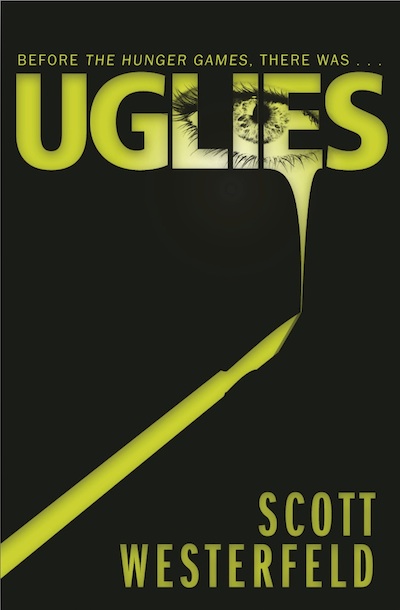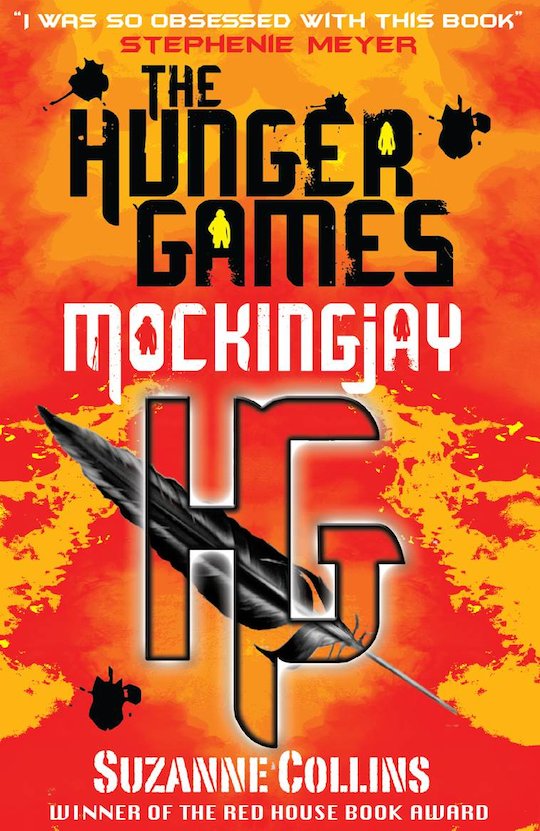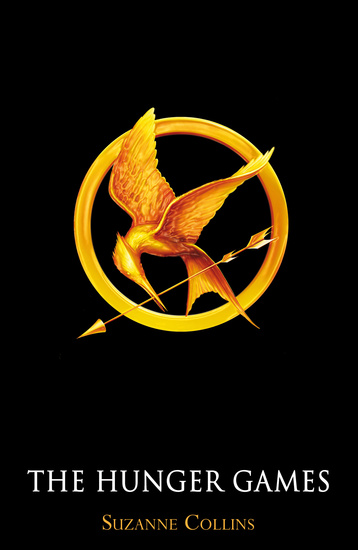Ramblings about books, films, cakes, weight loss and likely some terrible celebrity gossip. Politics is very unlikely.
Showing posts with label sci-fi. Show all posts
Showing posts with label sci-fi. Show all posts
Thursday, 19 September 2013
About Time
Richard Curtis has a bad rep. It's true that none of his films really have the hallmarks of a cinematic genius and in some manner resemble a feature-length TV drama. The storylines tend to be quite schmaltzy and in some ways entirely predictable: Hugh Grant (or someone much like him) will always get the girl.
About Time is, he claims, the last film he's going to direct/write. His previous films, particularly Four Weddings and a Funeral, Notting Hill and Love Actually have become quite seminal rom-coms. Where these are also much like a who's who of British cinema, About Time falls down. There are famous actors involved, most notably Bill Nighy, but for the most part it seems to be younger up-and-coming actors - i.e. the Hugh Grants of the future. However, in so many ways, it completely slams the Curtis' other offerings. I'll explain why.
Firstly, the lead characters and actors are very charming. There was no character in this that I wanted to get off the screen, whereas Andie McDowell and Julia Roberts need to do one in their respective films. Rachel MacAdams is one of my favourite underrated actresses: I have loved her since The Notebook and Mean Girls, yet she's never really come good on the fact that she is a really versatile performer. She's also kookily stunning. Domhnall Gleeson was also utterly delightful as Tim, the main character, even if he does sound identical to Hugh Grant. Billy Nighy was a wonderful dad. They all fit their parts really well.
The plot itself is pretty ridiculous: Tim finds out that the men in his family have always had the ability to time travel back through their own timelines. The science of this was massively glossed over and there were a wealth of paradoxes, so in this respect it was less well-plotted than The Time Traveler's Wife (loved the book, disliked the film, despite Rachel MacAdams - she is better in this). For much of the film, it lacked some conflict as the relationship between Tim and Mary, after a shaky start where he almost missed ever meeting her, trotted along nicely. The sub-plot of Tim's disaster-zone of a sister was a little too underplayed for much of the film and I think potentially she could have been either given more to do or removed entirely. However, I see nothing wrong with sometimes watching a film which is just nice; I really enjoyed watching Tim and Mary together for their relationship alone. In fact, I could have watched an entire film which was just that ordinary and lovely.
However, the lack of conflict for a large chunk of the film means than when the thunderbolt hits, it hits hard. I haven't cried in the cinema for a long time. Tears were rolling down my cheeks during the last twenty minutes of this film. I shan't spoil it for anybody who wishes to see it, but it's enough to say that the ordinariness of everything set against the bonkers world of time travel really works here, much as it does in my long-time love Doctor Who. Indeed, this film shares many of the themes of Curtis' episode from 2010, Vincent and the Doctor which talked a lot about ordinary life being utterly extraordinary if looked at the right way. The pain of life is something addressed by both film and episode, and leads into one of my favourite quotations from the TV show:
About Time is essentially a love story, between a man and a woman, and a son and his father. It talked of an ordinary life and how each day can be wonderful if we let it. If it was saccharine and schmaltzy, I don't care. It may not be the world's greatest film, but it has heart and soul and truisms and was frankly lovely. There are not enough lovely things in the world in my opinion. I adored it.
Tuesday, 20 August 2013
80 Books No.69: Z for Zachariah by Robert C O'Brien
In a weird coincidence, like Buddy, this book has links to my own school life as well as being a find in the book cupboard. I didn't read Z for Zachariah when I was at school, but we did do Mrs Frisby and the Rats of NIMH written by the same author. And I hated it. Looking back, one has to wonder why I liked English so much because I pretty much hated all the books I did until GCSE - a trend which is kind of reflected in my own teaching to date. I just remember Mrs Frisby being so stupid and irritating so why I thought this would be any different is beyond me.
This was worse. I couldn't believe it was as bad as it got in the last seventy or so pages. Until that point I had sort of been bobbing along with it, feeling that it wasn't very suitable as a reader at school, but was actually quite interesting. Set in a post-nuclear world, it's the story of a girl who survives when everybody else doesn't and what happens when a strange man arrives. It is a slow starter but when he suffers from radiation poisoning it gets a bit more interesting. After that, it just becomes odd: he becomes all sinister and she is uneasy, but spends most of the rest of the novel detailing her efforts to plant crops and tend the land. I have to be honest in that I skim read the end of this and feel almost no guilt in doing so. I was so bored.
Disappointing and now I have to decide whether we keep the books or not. Whatever, they'll be buried away on a top shelf at the very most.
80 Books No 66: Uglies by Scott Westerfield
Those of you with eyes and a vague notion of the patterns in my reading can probably guess from simply looking at the book cover why this found itself from Asda's shelves into my trolley and to my house:
1) It references The Hunger Games and I loved The Hunger Games. This had several similarities to Suzanne Collins' trilogy, but as the cover says, actually came first.
2) It's YA in general which we already know I'm a little bit obsessed by.
3) It has a black front cover. Oh how I freaking love a black front cover.
So it was likely to be a hit. The general concept was also quite interesting without all of those elements: a world where judging people based on their looks has been eradicated by ensuring all people are turned 'pretty' at the age of 16 via extensive surgery. The Pretties then inhabit a different area than the Uglies and are subject to less stringent laws. Tally Youngblood is looking forward to becoming a Pretty until she meets Shay and is introduced to the world of the Smoke, an outlaw community where Uglies can live forever with the face they were born with.
Collins has obviously ripped quite a bit from Westerfield's idea here: the female character, the dystopian world, the burgeoning teenage relationships. However, Tally is a different kettle of fish from Katniss Everdeen, at least in some ways. Tally is happy to conform to society's expectations of her at first and only reluctantly challenges the status quo. However, in quite a bold move, Westerfield actually makes her quite unlikeable as a hero as she begins by intending to betray her friends. Yes, she overcomes this, but things still don't work out well. Katniss, whilst being a bit whiny at times, is at least admirable.
The novel dragged at first as it felt like so many other YA dystopian fictions I've read. It was when Tally left the city for the Smoke that it became more engaging and whilst the relationship with David was a little clumsy, the opening preview of Pretties at the end of the novel seemed to develop the story in a promising way. If I get the opportunity I'd probably read the rest of the series.
Uglies has also been optioned for a film, although it's a slow old process. Would be interesting see how exactly they'd cast it!
Monday, 12 August 2013
80 Books No.64: The Eyre Affair by Jasper Fforde
After the less than thrilling read reads in the shape of On Beauty and The Bell, this book was frankly a breath of fresh air. It's a book I've seen in shops and heard talked about on a number of occasions and yet only got around to reading when I found it for 50p in a charity shop. The particular edition I bought was from World Book Night 2013, showing again its popularity. I have no idea why it has taken me so long to read this book.
The basic idea is that this book (and indeed the series which is now running to seven books with an eighth on the way) is an alternative 1985 where Wales has become a kingdom in its own right, the Crimean War has been going for over a century, airplanes have never been invented and everybody hates the ending to Jane Eyre. Special Operations law enforcement departments have been created in order to police things as diverse as time travel (The ChronoGuard) and the distribution and protection of books (LiteraTecs). Thursday Next is one such LiteraTec who finds herself investigating a crime where somebody is intent upon changing the plots of classic novels.
It sounds crazy and too far-fetched to be much good to anybody. What is so charming about Fforde's work is how aware it is of its own ridiculousness and the humour present throughout it. I read Shades of Grey last year (no, not the soft-porn series - though I did read that too), another Fforde novel where the future civilisation bases its class system upon the colours people can see. Another bonkers idea, but made entertaining through the wit and skill with which the author writes. How he comes up with his ideas, I have no idea, as he's included so many neat little details just for the sake of including them: the revival of dodos, for example, an aspect I really enjoyed.
The aspects of time travel and the preoccupation with literature made this a really entertaining read for me, and I'm interested in reading the rest of the Thursday Next series, as well as his Nursery Crimes series, where famous nursery rhymes are developed into real crimes and put on trial. There were probably bad aspects of the novel, but I'm ignoring them: I really enjoyed this.
Wednesday, 3 July 2013
80 Books No.44: The Hunger Games - Mockingjay by Suzanne Collins
Alas, Collins couldn't keep it going. I think having re-read this, I think even less of Mockingjay than I did before. Which is a real shame because I love the trilogy and this could have been good. I think the main problem is that the story has almost run out of steam - at least, that is, the story that began in The Hunger Games. Suddenly it all becomes bigger, and the really cool concept of teenagers killing each other for entertainment (come on, you knew this was what I really liked!) becomes a mere side product of a gigantic war and I hate war stories; it's why I've sacked off A Song of Fire and Ice.
Also, Katniss becomes such a doormat in this, constantly asleep or drugged or injured whilst everybody else makes decisions for her. Collins also kills off too many characters, although not, conveniently, anybody extremely vital to the story; she builds up or creates characters and then just bumps them off, which means you don't lose anyone you've invested in from book 1, but is a bit manipulative.
I think the film of this could be a bit tedious. We'll have to wait till 2014 to find out.
This is my shortest review, summing up my sheer disappointment in this novel.
80 Books No.43: The Hunger Games - Catching Fire by Suzanne Collins
However, before I explode, on 22nd November, I'm hoping to see The Hunger Games sequel Catching Fire. This re-read of the novel has only re-ignited my excitement for it, for the following reasons:
- the plot is good; I'd forgotten how good. In fact, in some ways it's better than the original because it throws you straight in with issues and character conflicts. The history with Katniss and Peeta means there's even more second-guessing and there's quite a bit more Haymitch, which is brilliant.
- Fennick is a cracking character. I'd forgotten about him too, but I'm excited. He better be hot and charming and live up to the character Collins has created.
- the arena is incredible in this one, so so clever. I loved the arena in the last one, but this one is a whole other level of great.
Aside from the film adaptation, this novel may actually be better written than the original, which is a nice surprise as I'd always remembered the series as deteriorating as it continued, much like the Chaos Walking trilogy did. My next review, however, is a bit of a disappointment...
Watch the trailer before that though
Thursday, 20 June 2013
80 Books No.40: The Hunger Games by Suzanne Collins
This is the first deliberate re-read of the year (I don't count The Way Things Look to Me as there was no intention to re-read that) and for a justifiable reason beyond I just felt like it. This is a contender for being purchased as a class reader at school and I wanted to double check there was enough to do with it; my conclusion is that there is definitely a massive argument for buying it. Hoorah.
Looking back through my blog, was there ever any doubt that I'd really like The Hunger Games? It has a depressing slightly futuristic setting, is aimed at teenagers and has kids killing each other. This pretty much sums up my blog. Suffice to say that I enjoyed this as much as I did the first time around, albeit if it was marginally less page turning as I already knew how it was going to end. In fact, reading it from a teaching perspective allowed me to see a variety of new things, such as how it relates to general dystopian fiction and how it, in some ways, breaks gender stereotypes. The opening pages in particular could be an interesting exploration over when exactly we realise Katniss is female as so much of the opening presents her as fulfilling a traditionally male role within her family and within the novel.
What I also found interesting was reading this in light of having seen the film twice. I thought the film was a really good one in its own right and would happily watch it again (let's see if I'm saying this in four years time when no doubt I'll have been badgered to watch it hundreds of times by students). Given that this was a first-person narration, it managed to convey much of the same feelings without the use of a voiceover. However, Katniss is infinitely more likeable in the novel as you can really get to grips with her feelings. Also, her unwitting double crossing of Peeta (an element which I think could have been developed more across the whole trilogy) is much clearer in the novel and leaves you thinking more positively about her.
I loved this book all over again and I'm dying to teach it next year now.
PS: And hello halfway point! I'm ten days ahead of myself, which is significantly less gained time than I had back in March, but then I wasn't falling asleep on top of the books regularly in March. I'm still pretty pleased with my progress, and I still have August in which to gain time. 80 books is suddenly looking more manageable.
Sunday, 31 March 2013
80 Books No.22: The Adoration of Jenna Fox by Mary E Pearson
This reminded me of a book called Eva which my year 7 English teacher tried to make me read at school. I remember reading maybe 50 pages and then claiming I'd finished it, just to get her off my back. I didn't enjoy the concept: that a girl's brain was transplanted into a chimp's as her parents worked with chimps. It wasn't my thing at age eleven and this probably serves as a timely reminder that I shouldn't try and force my students to read things they hate. Unfortunately this rules out much of the GCSE and A Level syllabus.
However, back on topic, The Adoration of Jenna Fox is a similar idea, albeit without the chimps. Jenna is involved in an horrific accident and is saved only by her father's medical break-throughs. The novel then follows her discovery of what has happened to her with some theological debates over what makes us human and how much medical intervention is too much. Her grandmother brings in a bit of religion, and there's a tiny bit of romance.
The themes surrounding the central plot are vaguely interesting, probably more to other people than to me, but even I was able to rethink some of the issues. I think I'd have engaged even more had Jenna been a more interesting character. Whilst part of her condition is about her finding out how to be 'the New Jenna', she also comes across as completely bland and characterless. The fact that all the characters are very similar in this respect suggests it's a case of poor writing than a clever narrative technique to reflect Jenna's struggle to regain her identity. The characters of Dane and Ethan are prime examples; Ethan was supposed to be some violent criminal but didn't have that in his character, whilst Dane was supposed to be threatening but did nothing.
The title of the novel refers to how Jenna's parents revere her even before the accident and how they'd do anything to make her perfect (something they literally have the opportunity to do after the accident). This is touched upon a few times, mainly with references to Jenna's dancing recitals. I'd have liked to see this expanded upon further, as it would have added extra drama to her attempts to form her own identity. There should have been more focus here, but there were so many plot strands that it lost some of its punch.
This is apparently the first in a series, which, given how this one ends, is rather strange. I'm not sure I'd read any more. It also seems to have had the film rights bought, which may work out quite well; it could be that this is one of those instances (like those mentioned in my review of The Silver Linings Playbook) where the film trumps the novel.
Subscribe to:
Posts (Atom)






